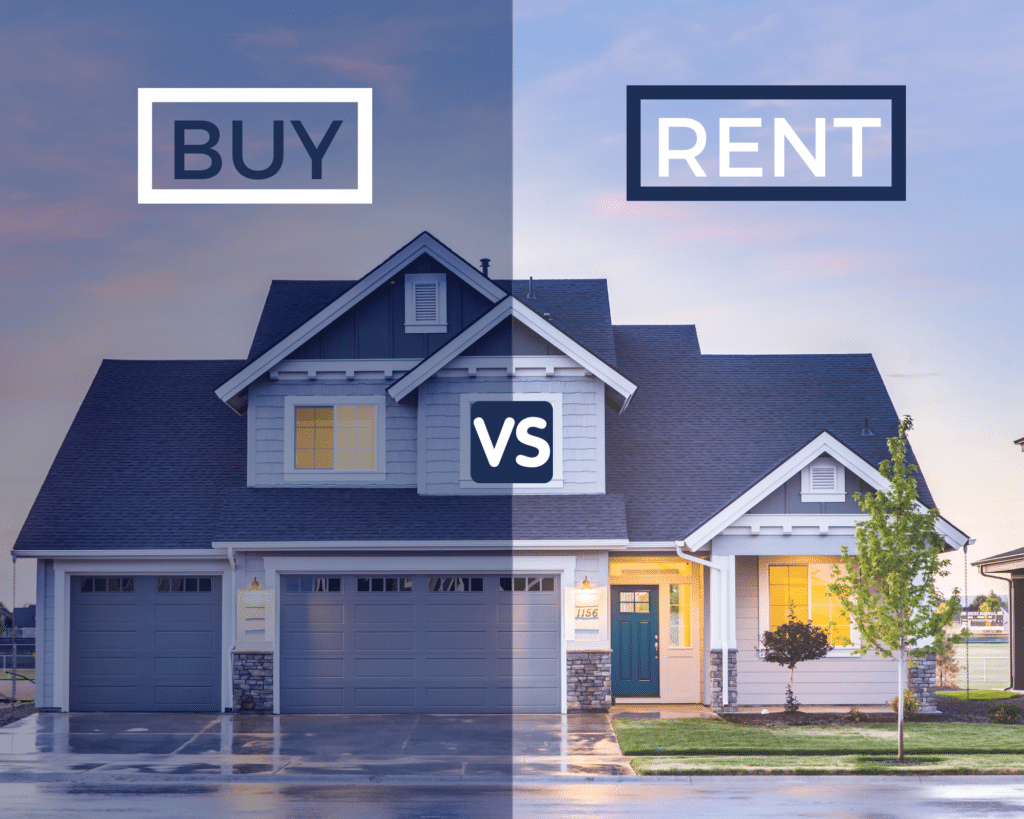Which is Better? Buying vs. Renting a Home

In today’s housing market, choosing between buying or renting a home can be a matter of circumstance rather than personal preference. However, the choice can be easier when the pros and cons of each avenue are considered, and family needs are accounted for.
Read on for an exploration of the most important aspects to keep in mind when searching for a new place to hang your hat!
The Pros of Buying a Home
Because it is not just about the money, it’s important to investigate all the aspects that go into becoming a homeowner. The following are a few of the greatest advantages to buying a home:
Stable Investment
Because housing tends to be one of the most stable investments you can make, buying a home can be a great option. It becomes an investment for the next several years, a place to enjoy life and perhaps raise a family. Even if the house itself loses value in the fluctuating market, the land will likely become more valuable, giving you an asset should you choose to invest in it.
Autonomy
Once you own a property, you can make all the alterations you wish! Homeowners have the freedom to paint walls, build a new deck, renovate the kitchen, or replace carpeting—whatever aesthetics your heart desires. The privacy and independence that come with buying a home are some of the major benefits in the eyes of most homeowners.
Build Equity
One of the best perks to owning a home is the equity you can build off it. Equity grows as your mortgage is paid off and is essentially the difference between what you can sell the house for and what is owed. By lowering your loan balance instead of paying interest, you build more equity which is helpful for future investments.
Fixed Payments
A fixed-rate mortgage means that homeowners can anticipate the same monthly amount for their interest and principal until the debt is paid off. So, though buying a home is more costly upfront, you can enjoy fixed payment rates that do not change often. And even though property taxes or homeowner insurance rates can contribute to fluctuations in the monthly cost, it doesn’t happen as frequently as rent increases for tenants.
Greater Stability
Owning a home can lead to greater feelings of stability, settlement, and pride. Becoming a homeowner is a significant investment, so people who buy houses tend to stay in them longer—even if it is because of the hassle of selling and moving. Buying a home gives you the confidence to stay in one place for longer and put down roots.
Tax Benefits
Homeowners can apply for all types of tax reductions and benefits after purchase. Interest on mortgage payments is deductible and home equity loans, portions of property taxes, and sometimes even closing costs. Make sure to research state and municipal tax laws to investigate standard and capping deductions and what kind of tax breaks you can apply for based on income, status, and location.
The Cons of Buying a Home
Though everything in life has its perks, buying a home also has cons. Let’s take a peek at the downsides of owning your own home, as follows:
Depreciation
If the value of your home falls, you may find yourself unable to sell it for a profit or even sell it at all if you owe more than the house is worth. Property values can rise and fall quickly, depending on the worldwide market and economy. The building can depreciate significantly over time if you do not maintain it and keep it updated with the latest specifications.
Less Mobility
Not only can homeowners not pick up and relocate quickly, but your options for work and life are also more anchored in the location of your house. It is more difficult to move to a different city for a job if you must first go through the process of selling your home. Additionally, even if your house has not lost too much value, it may not be as quickly nor easily sold as other assets, like stocks or even cars.
Maintenance Considerations
When you own the property, any maintenance issues or physical problems are entirely your responsibility. No landlords or property supervisors will be there to help, so hiring contractors or DIY projects are your jurisdiction. Any unexpected repairs or replacements must come out of your personal budget, so you might be faced with some unpleasant receipts if the plumbing springs a leak.
Upfront Cost
It’s no secret that the initial cost of buying a home is daunting. Between closing costs and fees, home inspection, title search, mortgages, first-year insurance premiums, and more, the upfront cost of ownership is high. Other hidden fees can creep up and stress your budget even further, leading to several years before you are even able to recuperate these costs and begin building your equity.
The Pros of Renting a Home
Homeownership is definitely not for everyone. And because the rental market in the U.S. alone is so competitive, it’s no wonder that families or individuals choose a lease over a purchase agreement. Here are some of the key considerations for why renting is a good choice:
Lower Cost
While this can be a relative metric, depending on your budget, location, and other circumstances, the price tag associated with renting a property can often be lower than purchasing a home. And though the cost is spread across many years in terms of mortgage payments, renting can be a more budget-friendly option for housing. This is especially true if you are a student or are unsure if you will stay in the area. You wouldn’t want to drop thousands of dollars on a property at once unless you were certain you would live there awhile.
Flexibility
Because rental leases typically range from 6 to 12 months in length, you are much more flexible in how long you will live at the property. Instead of locking yourself into years of a mortgage, renters are free to move around without the obligation to stay in the rental longer than the lease entails. If you like the feeling of absolute flexibility and freedom, you can get a month-to-month lease that allows you to make quick, impulsive decisions on when to move out.
Less Responsibility
Rental properties require tenants to perform very little maintenance. You are, of course, expected to keep up the rental in terms of cleanliness and minor repairs on your end. But more prominent issues of the property are the responsibility of the landlord or building owner. If one of the appliances breaks down or there is a problem with the heating, you don’t have to worry about it—just let your landlord know, and they’ll get it fixed.
Lower Maintenance, Lower Costs
Similarly, renters do not have to stress about unexpected maintenance or repair costs that might arrive. Because any appliances, utility systems, or other property issues are primarily the landlord’s responsibility, tenants are not expected to pay for them unless they directly caused the damage. So, renters don’t have to worry about unforeseen financial burdens that could come from a refrigerator on the fritz!
No Down Payment
Most rental properties come with the expectation that the security deposit will be returned if the space is sufficiently maintained. This is definitely cheaper than the down payment required to purchase a home. In addition, your rental property will likely only ask for the first and last month’s rent in advance, with the understanding that when you move out and clean the property out for the next renter, you will get these funds back in full.
The Cons of Renting a Home
Renting is not for everyone, as some of the following disadvantages to renting a property will show:
Instability
While laws prevent major fluctuations in rent or unjust eviction, renters are still in a more unstable situation than homeowners. Landlords can increase your monthly rent, put up prices for on-site facilities such as washers and dryers, or even put the property up for sale if the real estate market increases in value significantly. Of course, they will still have to give you adequate notice, but all these elements make renting more unstable in terms of costs.
Lease Rules
Tenants must follow all the little rules and details in a rental agreement or risk fines and eviction. From no pets being allowed to quiet time after 10:00 pm, the regulations in your lease are your bound obligations for the duration of your rental. You might be able to get some leeway by speaking with your landlord, but don’t count on it. They will likely be firm on most of the rules in the rental agreement, even if they seem trivial.
No Independence
It might be a small issue, but renting a home means it is never truly “yours.” Renters cannot make any changes to the house or property without the landlord’s express permission. Any personal touches to your rental must generally be mobile, removable, and nothing at all permanent, and some properties even dislike the use of command hooks or putty for hanging pictures on the wall.
No Monetary Benefits
Renting a property will not entitle you to any monetary benefits that buying otherwise would—including tax benefits and building equity. Renters are not eligible for any tax breaks or benefits that homeowners are, nor can they build equity while renting. Thus, while having a rental property can help boost credit scores minimally by accumulating successful payments on a card, you cannot produce true equity or value while renting a home, as the property is not your asset.
Pet Problems
Some rental properties certainly do allow our furry friends to live there, but not all—pets can be restricted in terms of their species, breed, size, and more. And when it comes to leasing a home, the rules and regulations are typically set in stone with dire consequences if you break them, including fines or eviction. And though some rentals do allow pets, it is commonplace to require a monthly pet deposit on top of your rent to guarantee you will keep pet-related damage to the property at a minimum and to ensure the landlord has the funds to repair any damage left behind.
If you decide renting is best for you, whether due to budget constraints or the flexibility it provides, check out our blog on how to be a good tenant.
Now that you know the pros and cons of both buying and renting it is time to decide which is the best option for you and your family. And no matter which option you choose, remember to get insurance, homeowners or renters, to protect your property and belongings!



